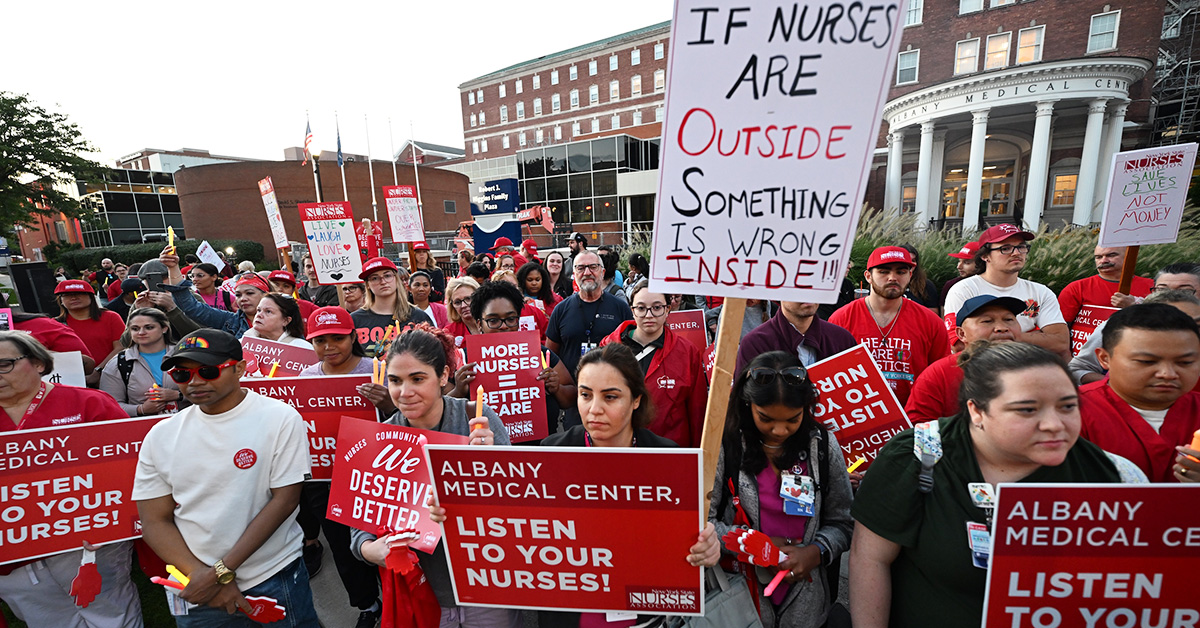Albany Med nurses fight to protect patient care

Hospital critical not only for capital region but across state
By Joseph Celestin
National Nurse magazine - July | August | September 2024 Issue
For months, New York State Nurses Association nurses at Albany Medical Center have been sounding the alarm about unsafe staffing levels at their hospital — and pointing to understaffing as the primary cause for a concerning decline in patient care at the facility. At the same time, they’ve been at the bargaining table, fighting for a contract that prioritizes patients over profits. But as the Albany Med administration continues to stonewall the negotiating committee and drag its feet on finalizing a contract, where does that leave the patients who rely on Albany Med for health care services?
Over the last 20 years, Albany Medical Health System has consolidated health care services across the capital region. Having acquired a significant number of nearby hospitals, the system now serves approximately one-third of all capital region patients. But the role that Albany Med plays across the entire New York state is far greater. As the only Level 1 trauma center between Westchester and the Canadian border, AMC serves the residents of 17 counties and is the only hospital capable of providing specialized medical care to patients suffering from traumatic injuries.
But in the midst of a staffing crisis, nurses at the hospital say that they can’t provide that care. And they’re right: Emergency department wait times at Albany Med are the longest in New York state, are some of the longest in the nation, and have only worsened over the last decade. Frontline nurses say that’s largely because hospital management isn’t doing what it takes to hire and retain enough qualified nurses at the bedside.
Since February, NYSNA nurses at Albany Med have been organizing town hall meetings, community speak-outs and forums, and press conferences to raise awareness about the severe staffing shortages at the hospital and the negative impact those shortages are having on their ability to provide safe, quality patient care. Patient stories that community members shared have been in line with nurses’ concerns: that understaffing at the hospital has led to excessive wait times and a decline in patient care.
After the success of these community forums and a press event following the expiration of their contract on July 31, nurses held an informational picket and candlelight vigil in late August to show Albany Med administration the seriousness of this issue and the immense level of support for their fight in the capital region. They were joined by hundreds of nurses, elected officials, labor leaders, and community members who all shared the same message: It’s time for Albany Med to start investing in safe, quality patient care for the community.
In late August, nurses returned to the bargaining table, with a mediator guiding conversations between the negotiating committee and Albany Med administration. Nurses have remained firm in their demands, which include safe staffing and a concrete plan to recruit and retain experienced nurses. Despite working with NYSNA nurses to create an agreed-upon safe staffing plan earlier in the year, hospital administrators refused to include staffing enforcement mechanisms in the contract. They’ve also refused to meet the negotiating committee’s demands for nurse pay and the inclusion of union rights in the contract.
But nurses are hopeful that change will come through finalizing a fair contract and with the extra validation of a long-awaited Staffing Deficiency Report from the Department of Health. Though Albany Med administration has thus far refused to share a copy of the report with nurses, NYSNA nurses know what it will reflect: that the hospital has violated the previously agreed-upon staffing plan that it submitted to the state. Nurses’ spirits have also been bolstered as the Department of Health, in a communication separate from the report, substantiated more than 50 staffing complaints that NYSNA nurses have submitted since the beginning of the year.
Despite the hospital administration’s refusal to budge on several top-line priorities, the executive and bargaining committees at Albany Med remain committed to the fight for a fair contract. Frontline nurses know that patients suffer when a hospital is not safely staffed, so they won’t stop fighting until they have the resources they need to provide capital-region residents with the safe, quality patient care they deserve.